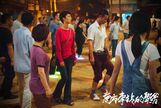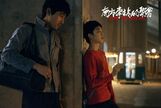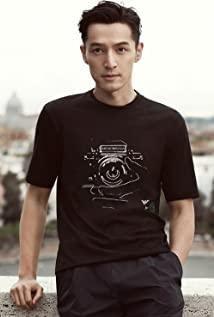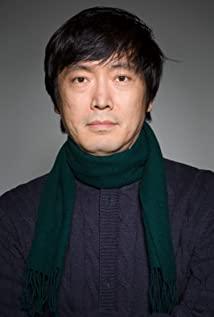After five years, the man is finally back with a heady party at South Station. Diao Yinan has never been a prolific director. Although he has been in the industry for many years, the number of feature films he has made so far can be counted on one hand. But Director Diao has never been disappointed. This time, his personal image style is stronger, and his control of the space and time of the play is more refined. He is still the fascinating author, and he has a master style. . The Diao-style noir film from "Fireworks in the Day" is quietly blooming on the shore of Wild Goose Lake this time.
"Fireworks in the Day" 5 years ago made me a super fan of Diao Yinan. The declining and decadent street scene of a small northeastern town, the marginalized people at the bottom of the society, and the desolate police are destined to be a tragic plot trend, all of which exude the unique charm of film noir. The "black" of traditional noir films mainly refers to two aspects. One is that most of the film's subject matter comes from the dark side of society, which is full of cynicism and pessimism. Conflict, revealing the darkness of human nature and the struggle and depravity of the little people in the process of investigation; the second is the gloomy image style, with many dark night scenes, using shadows to cut faces and the environment, and using low-angle lighting to create a dark and distorted image world . The detectives in the noir films are mostly anti-heroes, and they are largely isolated people. They look frosty, repress their feelings, struggle against their opposites alone, and are often trapped in a world of moral decay, where whatever choices are made, the outcome is often tragic. From this point of view, "Fireworks in the White Sun" is a very standard noir film. The fired police officer played by Liao Fan has been independently investigating a murder case related to Wu Zhizhen, and Wu Zhizhen played by Gui Lunmei is a Chinese-style snake and scorpion. The beauty is delicate in appearance and attached to men. Although she committed a murder case, she was affected by many objective factors, and more of it was the fault of the social environment and the times. Of course, she did not escape the punishment of the law in the end. On the other hand, "The Party at Southern Station", this time there is no clear detective role. Zhou Zenong is a criminal destined to die. Of course, he is also trying to find the traitor, avenge his younger brother and leave a bounty of 300,000 for his wife and children. The image of a tough guy is linked, but in general he is not the type of tough guy detective in traditional film noir; Gui Lunmei once again played the role of a femme fatale, and the role of the swimmer is better than that of the dry cleaner in "Fireworks" The social status is even lower, but Liu Ai'ai in this film is obviously more wise and assertive, and has a stronger sense of participation in the event. She told Zhou Zenong at the station about the strategy of receiving the bounty. She should have come up with the process of killing Huang Jue. The meaning planted in her grasp is that Liu Ai'ai is even more "black" than Wu Zhizhen. And Liao Fan was willing to play a supporting role this time, and the police officers headed by him produced a lot of black humor, which did not play a significant role in promoting the plot.
As mentioned earlier, Zhou Zenong is destined to be destroyed, and the whole film is essentially a long farewell to him. The most successful part of this film is that this farewell process, on the basis of realism, is full of the unique charm of poetic and Diao-style noir films. Since the film is still being released, I haven't been able to pull the film yet, so I can only briefly talk about my own viewing experience. The two protagonists, Zhou Zenong and Liu Ai'ai, have a very intriguing relationship between them. In the first scene of the opening scene, the rainy night borrowed fire. From Liu Aai's teasing words, "Brother, borrow a fire", "I can do what your wife can do", "I am satisfied with you", it can be seen that she Zhou Zenong has affection, and the scene where the shadows of the two are fused together under the dim street light also directly points out the fate of the two being bound, and also sets the tone for the film's extensive use of shadows. There are so many brothers around Zhou, but no one can trust him before the benefit of 300,000. Who would have thought that the one he could trust in the end was an inconspicuous swimmer, and his worried wife and children could not meet until the end.
As a smoker, but without a lighter, Liu Ai'ai asked Zhou Zenong to borrow fire twice, indicating that she was willing to take risks and rely on Zhou Zenong's bounty to get rid of her strong desire to be a swimmer. Borrowing fire was not only asking the other party for help, It is also an ambiguous guiding action. Compared with Pingping, the swimmer played by Zeng Meihuizi, who is active and charming towards the guests, Liu Aai's performance has always been indifferent and ignorant, so for her, borrowing fire is already her active attachment, and even she It is possible that he did not have the habit of smoking at ordinary times, and he made this move just to express a low profile. After she got the bounty at the end, Liao Fan greeted her to smoke in the car. She didn't take it at first, but picked up the cigarette after hesitation. For the first time in this film, she didn't borrow the fire and took out Zhou Zenong and left it behind. lighter to light a cigarette. The previous borrowing of fire was her reliance on others, and this time she put the lighter back in her pocket after lighting the cigarette, which symbolized that she was finally in control of her destiny. Of course, because she smoked Liao Fan's last cigarette, Liao Fan happened to break the two people's money when he went to buy a cigarette.
Similar to cigarettes, Liu Ai'ai's hat is also a prop that runs through. To Liu Ai'ai, the hat is like the imprisonment of her status as a swimmer. The more she hates this profession, the more she wants to take off this hat. This is why when she and Zhou were on the boat, she lost her hat and forgot her identity as a swimmer. It was only for a woman's love for a man, not money, that she took the initiative to have a relationship with him. Here, the director specially gave one A shot of the hat sinking to the bottom of the water. Zhou Chengcheng was numb and indifferent, neither pandering to nor resisting. After the incident, he took out a hundred-yuan bill with blood to Liu Ai'ai, not only to leave evidence so that Liu could get rid of the suspicion of the police in the future, but also to tell her that the two Just a transaction on another level, no emotion. This erotic scene is very artistic. In the isolated space on the boat, it has a subtle combination with water, especially the scene of Gui Lunmei gargling with lake water, which is very clever and reminds me of Zeng Meihuizi in "Pluto Moment" That astonishing erotic expression of hand-to-hand water can be regarded as the two best erotic scenes in Chinese-language films in recent years, and it is very coincidental that Zeng also starred in this film.
In terms of visual expression, the damp and dark environment and narrow alleys are the traditional elements of film noir, such as the presentation of classic noir films such as "M is the Murderer" and "The Third Man", Diao Yinan's extensive use of shadows and low-contrast Lighting, the city itself is almost isolated from the movie, what is presented to the audience is the cramped street scene of an ordinary urban village in China, the messy night markets and snack bars that can be seen everywhere, and the decaying small town in Northeast China in "Fireworks in the Day" The scene is the same, only moved to the south. In fact, it doesn't matter where the story takes place, what matters is the story itself. Only by stripping away the environment can we better focus on people. All the characters are forgotten and displaced people in this city. They have nothing to do with any grand narrative, but are just wandering souls by the wild goose lake. Many characters in this film are often hidden in the shadows, and the magic of light and shadow contrast, Diao Yinan has achieved the ultimate in the tracking part. In an impressive scene, when Zhou Zenong was trying to escape from the chase, he panicked and ran away from the screen, but the camera did not follow him, but kept the focus on the spot. Zhou's footsteps are getting faster and faster, and his shadow is getting bigger and bigger in the same place. This is really a very charming display method. A simple shadow change, everything can be said. Panic is much better than Hu Ge's running away from the front. At the same time, the shadow composition on the wall is also imprisoned and alone, which means that running away is lonely and futile. . Another impressive thing is that when Liao Fan went to Zhou's house to search, in front of Zhou's wife, Liao Fan turned on and off the lights in the house several times during questioning. The change between light and dark was actually Liao Fan behind asserting its control. Turning on and off the lights in a stranger's house is a strong and dominant gesture. This very simple action shows that the situation is under Liao Fan's control, causing psychological suggestion and oppression to Zhou's wife, prompting her to cooperate with the police. . On the other hand, since Diao Yinan is a big fan of Danish director Nicolas Winding Refn, we can also see a lot of traces of "Desperate Driving" in "The Party at Southern Station" and "Fireworks in the Daytime" . Diao Yinan's use of color and choice of lighting, in addition to the darkness at night, there are also many scenes of neon colors, such as the bizarre dance hall, the luminous shoes worn by the police when they dance in the square, and the overall image tone of the film. A great contrast is formed, making the film more three-dimensional and with a stronger visual impact.
In this film, Diao Yinan also continued to add the absurd and surreal elements that he has always preferred. The most obvious example is animals. Compared with a horse without an owner that suddenly appeared in the corridor of a residential area in "Fireworks in the Day", this time Diao Yinan went a step further and took a picture of the zoo. I remember there were owls, elephants, Flamingos, monkeys, and of course the frightened tiger, the whole animal is ferocious. The montage that jumps from the close-up of the animal's eyes to the close-up of the criminal's eyes in hiding is one of my favorite shots in the film. In one word, it's a glimpse. Diao Yinan uses these animals to create a strong sense of absurdity. Humans and animals appear side by side, which seems to be different but not different. Survival and escape are also the laws of the animal world. Filled with your life-and-death terror. Betrayal and deceit are rife between people, too, and each character is a painful and lonely individual in a ridiculous world. In addition, the freak show woman She who flipped a coin and sang the Solo River, a row of washing machines at the entrance of the alley, and Hu Ge saw the lively old news on the wall in a trance. All these images make people feel absurd and even surreal. While achieving the effect of alienation, it blurs the boundaries between life and death, fantasy and reality, interprets the character's spiritual distress and inner entanglement to the extreme, and also highlights the incompatibility between the individual and the grand narrative. The flying saucers in "The Good Man in the Three Gorges", the Peking Opera Dan's Corner, and the large-scale sculptures launched like rockets are quite similar in purpose.
The director's dark humor is also reflected in the symmetrical editing of the police and the gang of thieves. When the two sides made plans, they used the map to divide the territory according to the names of the people; the thieves and the police had the scene of riding motorcycles in the street in groups, and the policemen also collectively played the role of a motorcycle driver and a square dancer; Zhou Zenong Below the ambushed Room 302, several police officers were searching Huahua's room. This method of one-to-one correspondence between the activities of the good and the evil has appeared in "M is the Murderer", and Diao Yinan's tribute to the classics is just right. There are also frequent effects that use everyday sounds to create suspense, such as the sound of popcorn exploding, which not only frightens the criminal gang, but also the audience; the thermos falls on the ground, the knife hits the chopping block, and the gun cuts through the iron. The fences are all sudden bursts of sounds in the tranquil atmosphere. These sounds not only advance the development of the plot, but also keep the audience tense and join the play. All of these prove that Diao Yinan's meticulous polishing of the details of the film, after all, it was five years of hard work, and it was indeed not in vain.
"The Gathering at Southern Station" is full of alienation in the context of the times. In a place where stealing an electric car can develop into two major gangs, it is not the love of the rivers and lakes that can make people's hearts surge, but money. Everyone was at a loss and didn't know why they lived. Diao Yinan used the camera as a paintbrush and a black image as a canvas to paint a huge Ukiyo-e about little people. Everyone was passing by, and everyone was powerless. If "Fireworks in the Day" is a memory of the glorious era of heavy industry in the Northeast, then "The Gathering at the Southern Station" is a faithful record of all the forgotten little people of the moment. When the train of the era whizzed past overhead, everyone's murmurs seemed to be inaudible.
View more about The Wild Goose Lake reviews











